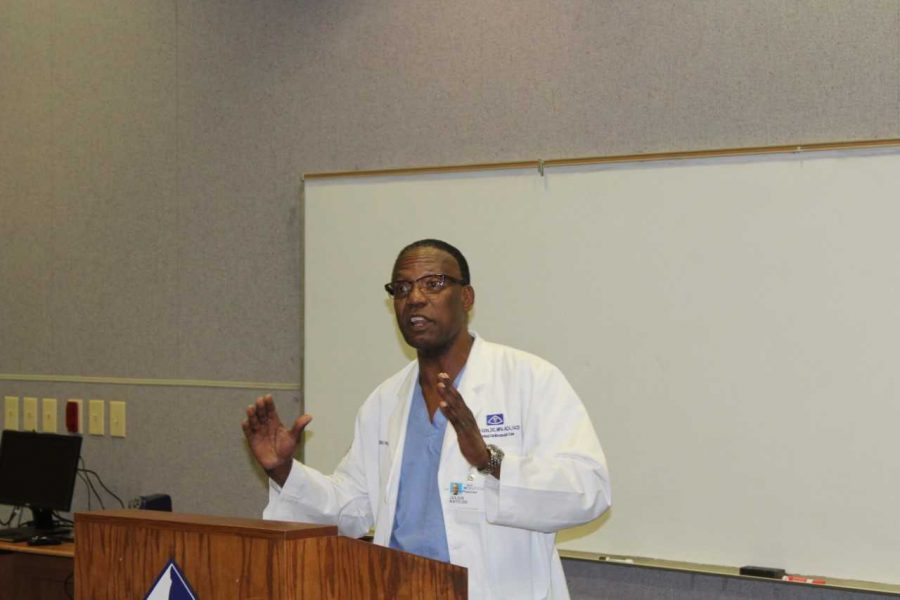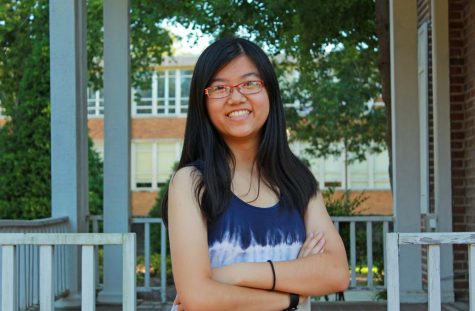Ugandan Refugee Dr. Julius Kato Visits MSMS
Dr. Julius Kato is a cardiologist at Baptist Memorial Hospital – Golden Triangle’s Columbus Cardiovascular Care Center.
October 29, 2018
On Monday, October 22, 2018 MSMS’s Future Physicians of America clubs welcomed Dr. Julius Kato to to speak about his journey from his flight from Uganda to the United States and his journey through medical school.
Dr. Kato is board certified in cardiovascular medicine by the American College of Osteopathic Internist. Earning his degree at Michigan State University, Dr. Kato completed residency at Genesys Regional Center in Grand Blanc, Michigan before coming to the Golden Triangle from St. Rita’s Medical Center in Lima, Ohio.
Dr. Kato began his educational journey at his Catholic school in Uganda, stopping around 8th grade because of political turbulence. Dictator, Ida Amin overthrew the country and killed and imprisoned people that challenged the government. One day, Dr. Kato came home from school and found military soldiers in his house, pointing guns to his mom and his brother. His mother desperately told him to escape, so he fled to Kenya without an ID.
“They have checkpoints that check for your ID. You could see a lot of guns. I crossed [the border] steady and fast. There were a lot of police,” commented Kato.
Dr. Kato wished to continue schooling, even though he was now a refugee in a foreign country. So, he began taking classes from a Catholic bishop. On his assessments, he would place second or third. This success allowed him to be recruited to the United States and study medical technology in Ohio. In order to get in and place, he needed to take a test. Dr. Kato felt anxious about taking this test.
“There are several hundred people taking the test. I have to have confidence. I am competing against people with PhDs, and I have a high school diploma. I come out number ten.” Kato explained.
Dr. Kato later made his goal to get into medical school for cytology where 82 people applied for 2 spots. He made his strategy to stay “invisible,” or unseen by other peers, but he was afraid of being stalked. After making it into the school, he was determined to make the most out of his educational experience.
“During lunchtime, I would take naps at the library for an hour and half. I would study the slides she [Mrs. Franco] would give us, and when we take the test, I would keep saying ‘next slide please’, and people would get annoyed at me.”
After Dr. Kato finished medical school, he went to Lancing, Michigan to work in cytology. He worked and went to school full time.
“I wake up at 4 in the morning, go running, then go to work at 5 in the morning, then begin work at 6 and finish at 2pm. Then, I go to Michigan State, go to school, study at the library until midnight. And it was the same thing every day.”
Later, he taught cytology to medical students. He describes that he knows everything underneath the microscope, but he expresses discontent about figuring out the disease but not receiving credit because the doctors diagnose it. However, he did not want to be a doctor because it would take too long.
One day at Michigan State, the dean and admission committee called Dr. Kato and told him that 5,000 to 6,000 people applied, and they wanted him to come. Dr. Kato was surprised that they chose him, and they said that their main concern was whether or not he would like to come.
“I am thinking, there is something of me that they are looking at. This whole trip changed me. I was thinking I could do medicine, I could do medicine. I’m going to be in the front; I know how to make diagnosis and treat!”
He then had to make the decision to choose what to specialize in. He chose to specialize in cardiovascular medicine. He expresses great passion about the importance of the heart.
“The heart doesn’t need you, you need the heart. So you need to be nice to the heart or else the heart will say we’re done. You can destroy it, or you can do something.”
Dr. Kato continues to inform everyone that heart disease is the number one killer, and people can start developing symptoms around age 12. Dr. Kato sees his patients as blessing because they allow him to treat them, and he sees them living a better life.
“I work so hard my entire life just for you to be here, so I can take care of you. I’m seeing you because of all those years I put into school. I put in school for you.”
His friend, Baptist cardiovascular surgeon Dr. Hector Dox invited him to come to Mississippi. After learning that Mississippi was the state with the highest rate of cardiovascular disease, he immediately decided to bring his practice here.. Dr. Kato now works at the Baptist Medical Group in Columbus, Mississippi, specializing in cardiovascular medicine.
Students overall have very positive responses to the speech.
“His story was really filled with resilience. I have heard other doctors and professionals speak before, but he has a unique pathway that is not replicable. Just hearing his story, his attitude towards school, being at a place with little to no opportunity, is very inspiring,” Maria Kaltchenko said.
“It was definitely very inspiring. I admired him; he went through all this hard stuff in life, but he doesn’t put emphasis on how he suffered but how he got over it. I liked how he said that the bad times help you to be on top,” Liz Huynh stated.
To end the speech, he gives a piece of advice.
“Stay focused and keep everything organized. For future physicians, everything is doable. We have the same head, same legs, and same arms. That means it’s doable.”










Remi • May 26, 2025 at 9:23 am
I worked with Dr Kato on a stretch of his medical journey. He is absolutely committed to the art of medicine, taking care of his patients, he’s intelligent, very approachable and compassionate.
Absolute gem to the medical community.
Keep up the good work bro.
Remi.